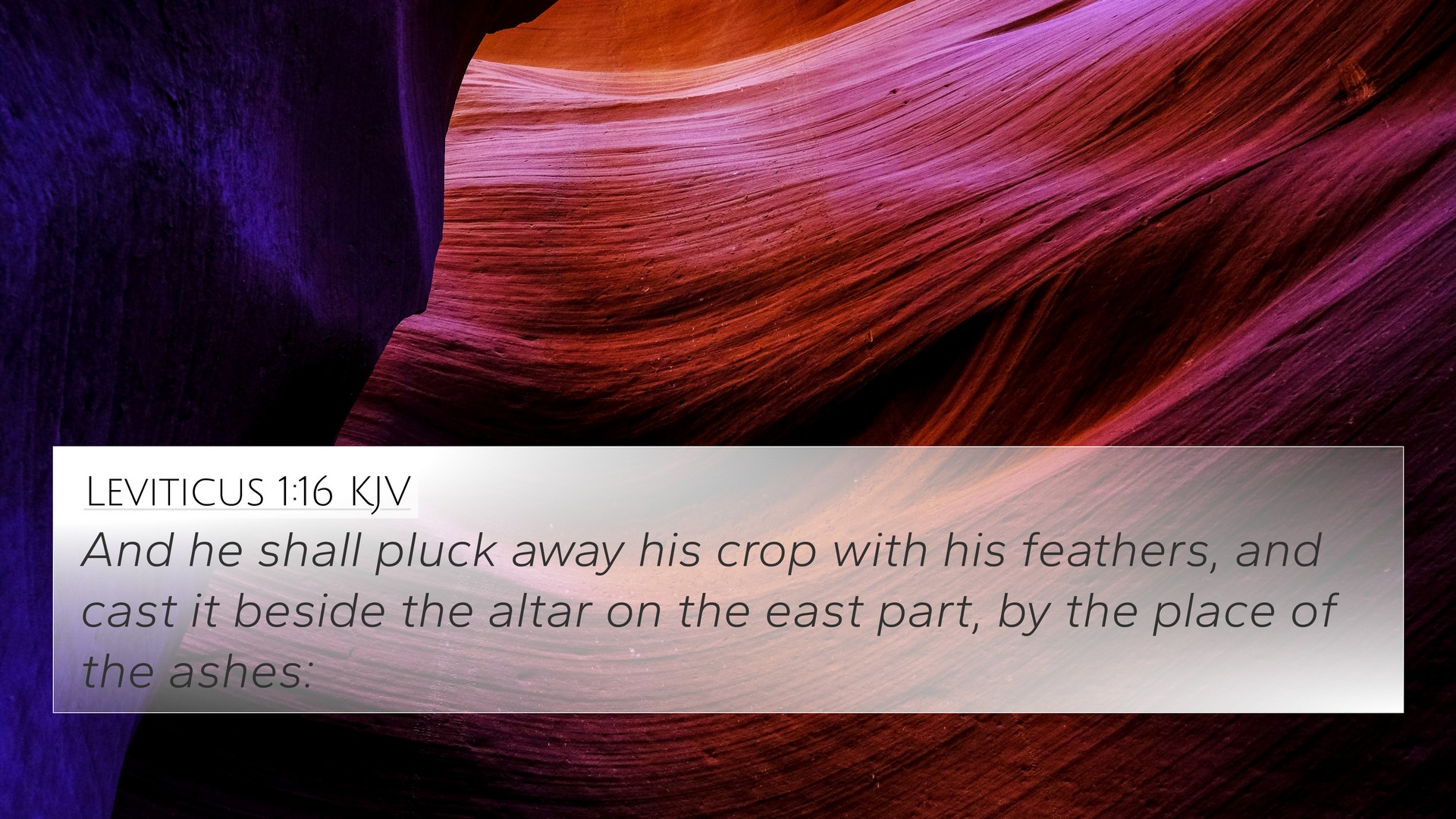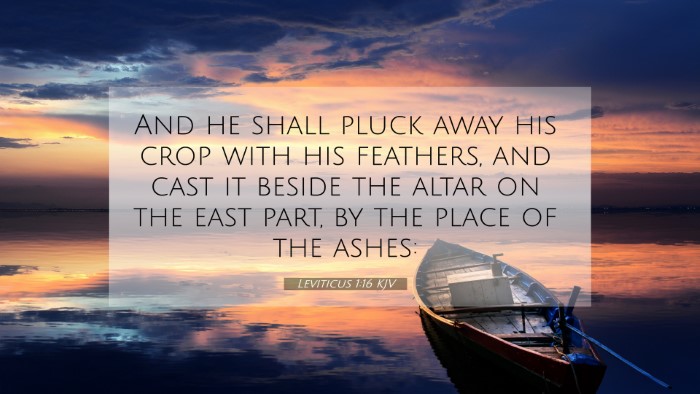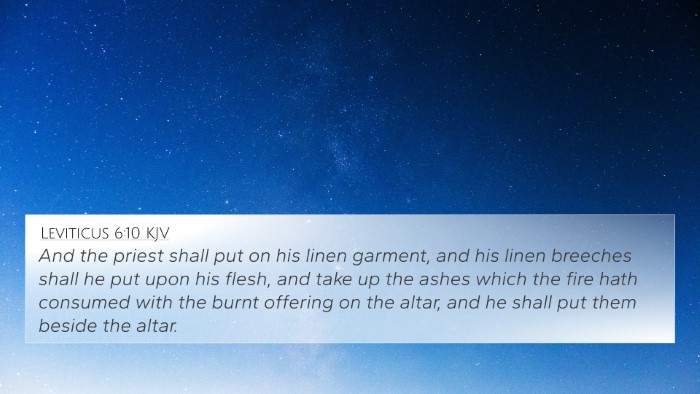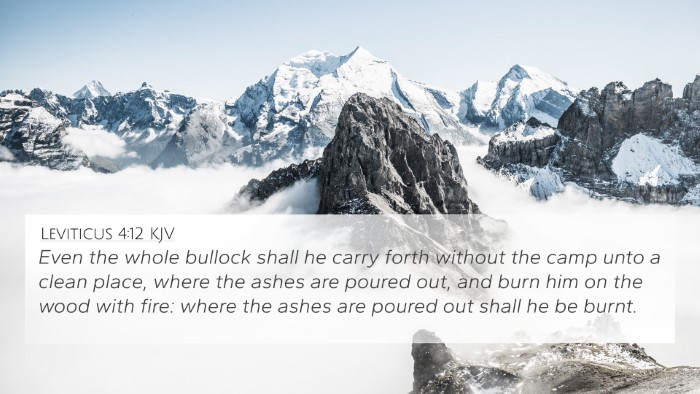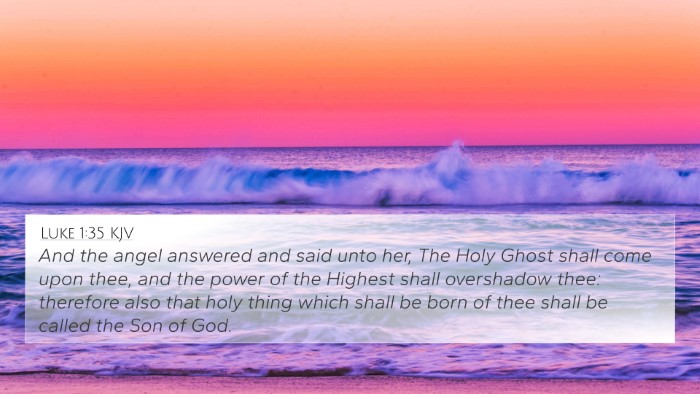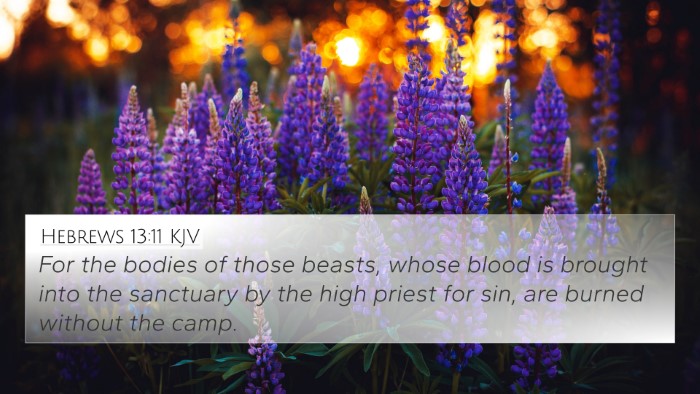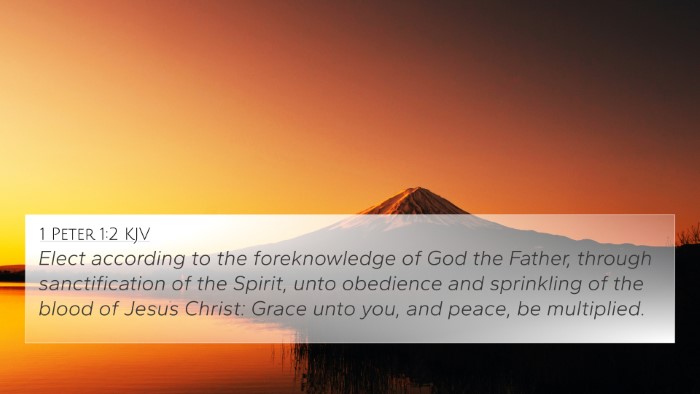Understanding Leviticus 1:16
Leviticus 1:16 states: "And the priest shall pluck away the feathers, and cast them beside the altar on the east part, by the place of the ashes." This verse is part of the instructions surrounding the burnt offerings, which hold significant meaning within the context of sacrificial worship in the Old Testament.
Summary of Biblical Meaning
This verse outlines the procedure for offerings made by the Israelite community. The location of the ashes signifies the place where sacrifices were consumed. Through this process, the act of removing the feathers indicates the separation of the offerings, which reflects the need for purification and symbolic cleansing before presenting an offering to God.
Commentary Insights
- Matthew Henry: Henry emphasizes the importance of the offerings as a means to approach God. He suggests that this act of plucking away the feathers serves as a symbolic indication of removing what is unnecessary, focusing the offering directly toward God, who desires purity and devotion from His people.
- Albert Barnes: Barnes interprets the process as not only a religious formality but as a representation of the believer’s need to remove sin and distraction before making offerings. He notes that the significance of casting the feathers beside the altar symbolizes laying aside hindrances that can obstruct a true connection with the Divine.
- Adam Clarke: Clarke elaborates that the specific location for laying the feathers demonstrates the systematic nature of worship in the temple and how offerings are ordained. He points out that the spiritual lesson here is the need for a heart that is prepared and purified when coming before God.
Related Bible Verses
Leviticus 1:16 connects with several other scriptures, forming a rich tapestry of understanding sacrificial practices and their implications:
- Leviticus 1:14: "And if the offering to the Lord is a burnt offering of birds, then he shall bring his offering of turtledoves or young pigeons." – This verse further describes the types of offerings accepted.
- Genesis 8:20: "Then Noah built an altar to the Lord and took of every clean animal and of every clean bird and offered burnt offerings on the altar." – The established principle of offering to God begins early, showing continuity in worship practices.
- Exodus 29:18: "And you shall burn the whole ram on the altar; it is a burnt offering to the Lord. It is a pleasing aroma, a food offering to the Lord." – This emphasizes that burnt offerings are meant to be completely consumed in worship, reminiscent of Leviticus 1:16’s purification significance.
- Psalm 51:17: "The sacrifices of God are a broken spirit; a broken and contrite heart, O God, you will not despise." – A reminder that God desires inward sincerity, paralleling the outward act of offering in Leviticus.
- Hebrews 9:22: "Indeed, under the law almost everything is purified with blood, and without the shedding of blood, there is no forgiveness of sins." – This New Testament verse connects the sacrificial system with the understanding of Christ’s ultimate sacrifice.
- 1 Peter 2:5: "You yourselves like living stones are being built up as a spiritual house, to be a holy priesthood, to offer spiritual sacrifices acceptable to God through Jesus Christ." – This links the concept of offering with the believer's spiritual life today.
- Romans 12:1: "I appeal to you therefore, brothers, by the mercies of God, to present your bodies as a living sacrifice, holy and acceptable to God, which is your spiritual worship." – Here, Paul encourages the believers to offer themselves in a way that is pleasing to God.
Thematic Connections
The theme of sacrifice runs throughout the Bible, forming connections between numerous text passages. The act of sacrificing an animal, such as specified in Leviticus 1:16, lays a foundation for understanding themes of atonement, purity, and devotion:
- Purity in Worship: The notion of removing feathers signifies the need for emotional and spiritual purity in worship, applicable through various connections to other verses about sacrifice and loyalty to God.
- Divine Acceptance: The way burnt offerings are performed points to God's acceptance criteria, as reflected in contrast between offerings that are authentic versus those done ritualistically (Malachi 1:10).
- The Role of the Priest: Highlighting the priest's duties in Leviticus emphasizes intercession in worship, which transitions into understanding Christ as the ultimate High Priest (Hebrews 4:14-16).
Cross-Referencing Biblical Texts
Cross-referencing biblical texts is crucial for deeper understanding. Tools for Bible cross-referencing provide readers with a way to connect passages systematically. For instance, both Old and New Testament scriptures create an inter-Biblical dialogue that portrays God’s desire for relationship with humanity through acts of worship and sacrifice.
How to Use Bible Cross-References
- Identify key themes within a verse and search for related passages.
- Create a thematic Bible verse analysis for deeper comprehension.
- Utilize a Bible concordance or reference guide to explore connections between verses.
- Engage in cross-reference Bible study methods to enrich understanding of biblical narratives.
- Study parallel verses to grasp varied perspectives on sacrificial themes across the scripture.
Conclusion
Leviticus 1:16 is not merely a directive for ancient rituals but signifies deeper spiritual truths relevant to all believers. By engaging with its context, observing its connections to other scriptures, and utilizing cross-referencing tools, believers can enrich their understanding and application of God’s Word in their lives.
